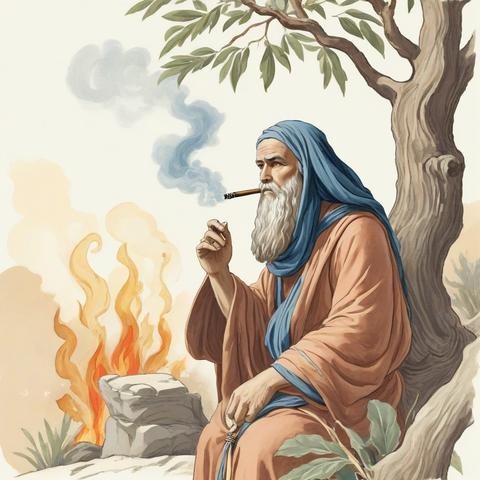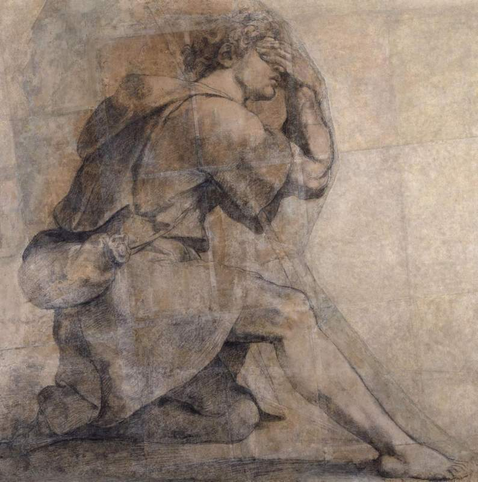#ai #aiArt #aiArtWork #Moses #BiblicalArt #BurningBush #CreativeArt #ContemporaryReligion #ModernTwist #ReligiousImagery #ArtisticExpression #Surrealism #ai #aiArt #aiArtWork #Moses #BurningBush #BiblicalArt #CannabisArt #SurrealArt #ReligiousImagery #AlternativeHistory #BiblicalFigures
#BurningBush
My state’s general assembly just passed a bill banning the sale of various invasive species. By a landslide 124-19 🤩 See? You can get conservation work done, even in purple and red states. Yay!
No more sale of all varieties of Japanese honeysuckle, sericea lespedeza, perilla mint, burning bush and Callery pear
#Missouri #InvasiveSpecies #conservation #JapaneseHoneysuckle #BushHoneysuckle #SericeaLespedeza #PerillaMint #burningbush #callerypear #BradfordPear
"Moses Kneeling in Front of the Burning Bush," Raphael Santi, 1514.
Raphael Santi, known now as simply Raphael (1483-1520) is regarded, along with Da Vinci and Michelangelo, part of the Holy Trinity of Renaissance art.
The son of a noted painter, he took over his father's workshop as a young lad and became a very productive painter. Despite being only 37 when he died, he left behind a huge body of work.
He had a rivalry with Michelangelo, and both worked in the Vatican. Michelangelo was popular for centuries but in the 18th and 19th centuries Raphael's more serene and harmonious compositions came into vogue and were a big influence on Neoclassicism. But they ended up being thrown out by the Pre-Raphaelites.
From the Museo di Capodimonte, Naples.
🟡 Burning Bush Flowers 1915 Hannah Borger Overbeck
#American, #BurningBush, #Early20thCentury, #EuonymusAlatus, #Flowers, #HannahBorgerOverbeck, #USA, #WingedSpindle
Vintage ◦ Classic ◦ Historical | Art ◦ Design ◦ Inspiration | Restored ◦ Enhanced ◦ Remixed
Prints, T-Shirts, Stickers, & More by @rocketshipretro via RedBubble → https://bigplanetprints.com/go/ZpjjvH
“Prone to Wander…”: Desecrating Sacred Ground
Psalm 63:7-8 For you, Abba God, have been my helper, and under the shadow of your wings I will rejoice. My soul clings to you; your right hand holds me fast.
Introduction
I mentioned recently that, “Come Thou Fount” is not only one of my favorite hymns but is the inspiration for my messages through out Lent. As our sign out front says: “Prone to wander, Lord, I feel it; Prone to leave the God I love.” While the third verse is my absolute favorite, the other two are remarkable. For this week, the first verse aligns well with our First Testament passage.
Come thou fount of every blessing,
tune my heart to sing thy grace!
Streams of mercy never ceasing,
call for songs of loudest praise.
Teach me some melodious sonnet,
sung by flaming tongues above.
Praise the mount! Oh, fix me on it,
mount of God’s unchanging love.[1]
Remember that the season of Lent is about taking a deep, long, hard look in the mirror. The reality is, while we may not think about it often, we are prone to wonder from God. And by “we” I mean *all of us*–you, me, and whoever is sitting next to you. And this verse exposes us in a very subtle yet real way. The verse weds the concept of teaching through singing and music making with being fixed on God’s mountain. The solicitation of the fount of every blessing—God—is the source of our blessing, of our singing, and the ground of our sure foundation. As in, as our feet are anchored in and on the “mount” of God’s unconditional, never stopping, always and forever love, we find ourselves on terra firma. God’s love for us is the solid ground from which our life, love, and liberation spring eternal; from this place, we should not wander.
But we do. Sometimes we wander because we forget that where we stand and on what we stand matters. Forgetting that we stand in and on the firm foundation of the proclamation of the gospel of Jesus Christ, leads us to treat the very ground under our feet—the ground from which springs our very sustenance (food, shelter, clothing)—as if it has no essence of its own and is *only* there to be an object in our grand schemes to acquire power, prestige, and privilege, mere product for our grist mills. In forgetting where and on what we stand, we find ourselves tromping about and treading all over other people (our neighbors, the beloved of God), devaluing their alterity, their identity, their irreplaceable presence, demanding that they look and act more like the dominant group. When we forget that the mount on which we are fixed is the mountain of God, we desecrate sacred soil, leaving our shoes on as we step wherever and on whomever we need and want.
We are prone to tromp and tread about because we are prone to wander from our God of love.
Exodus 3:1-15
Moses was keeping the flock of his father-in-law Jethro, the priest of Midian; he led his flock beyond the wilderness, and came to Horeb, the mountain of God. There the angel of God appeared to him in a flame of fire out of a bush; he looked, and the bush was blazing, yet it was not consumed. Then Moses said, “I must turn aside and look at this great sight, and see why the bush is not burned up.” When God saw that he had turned aside to see, God called to him out of the bush, “Moses, Moses!” And he said, “Here I am.” Then God said, “Come no closer! Remove the sandals from your feet, for the place on which you are standing is holy ground.”
The First Testament text is from Exodus and highlights God’s calling of Moses. An interesting story in its own right; nothing beats a spontaneously combusting bush from which God’s voice beckons a person minding their own business. In my research, I discovered that this story is not a smooth, cohesive unit. Rather, it’s a merger from two different sources according to the Hebrew words—there’s different names for God and Pharoah, textual redundancies, and a textual intrusion.[2] I know that sounds like mundane, academic chatter; yet, knowing this actually helps the goal of this sermon. This splicing together of the text indicates that there’s an important theme being preserved and emphasized: God’s self-identification to Moses, Moses collision with God, and Moses’s subsequent sending by God.[3] From this moment on, the ground under Moses’s feet is going to be the mount of God’s unchanging love for God’s beloved, the people of God whom Moses represents and to whom Moses will (soon!) represent God. For it is there on Horeb—“the mountain of God”—where Moses comes face to face (flame?) with God on sacred, holy land.[4]
The text tells us that as Moses is on Horeb, he notices a bush that’s burning. This isn’t just any spontaneously combusting flora; it’s God’s presence,[5] and it’s intentionally trying to get Moses’s attention.[6] As the bush burns and doesn’t burn up, Moses is curious and comes closer. Then the text tells us that this is part of the reason for the flame: to get Moses’s attention—not just anyone but this one, the son-in-law of Jethro, the one called Moses. So, the bush calls out to Moses using his name twice. (The double use being an affectionate calling.) After Moses responds to the divine voice coming from the bush, God stops Moses from coming any closer and commands him to take off his shoes. Why? Because there are some places that are holy and sacred where one must walk carefully and tenderly; places where one must come and enter humbly and vulnerably. Everyone walks a bit different with shoes on, faster and with less concern for where they place their feet. But as soon as shoes come off, we walk slowly and with more concern for where we place our feet, being aware of both our ability to damage and be damaged.
In this sacred place and in this vulnerable position, Moses receives God’s self-disclosure. God tells Moses, “I am the God of your father, the God of Abraham, the God of Isaac, and the God of Jacob.” In this self-declaration, God also becomes the God of Moses. Standing on the mountain of God, face to face with the divine flame, shoeless and vulnerable, Moses received not only God’s self-declaration thus God’s self (coming into personal contact and experience with God like his forefathers[7]), but also his calling. After explaining that God has heard (and felt! cf. Ex. 2:25) the painful and tormented cries of Israel dying under oppression and alienation, God is going to deliver God’s people into liberation, and Moses will be the one through whom God will conduct this promised exodus. Here, Moses goes from shepherd to prophet.[8] Everything Moses does and says—from this moment onward—will work toward the liberation of God’s people from the oppression of Pharoah. From this day forward, everywhere Moses walks is sacred ground for God promises to be with Moses[9] for God will be who God will be:[10]that is, the one who will go with Moses and Israel.
Conclusion
None of what is in this passage from Exodus is about Israel forgetting where and bon which they stand. In fact, it’s about Moses being made aware that he’s on holy ground and will be as he walks into Pharoah’s throne room and demands the children of God be released and all in God’s name for God is with him. But here’s the thing, the bulk of Exodus is about exhorting Israel to stay with God, to keep their eyes on God, and walk with God thus walk with their neighbor and correct the wrongs in the world. But why? Why is this story a focal point in Israel’s history? Because, well, Israel has a history of finding themselves tromping about, shoes on, causing violence to the neighbors and to themselves, eager to bring glory to themselves, and forgetting the holy ground on which they stand with God. They will forget that their ground is hallowed and that they should tread tenderly and vulnerably. I say this not only because I’ve read the book; I say this because in a few chapters in this text, Israel will be liberated and will rejoice with singing and dancing and then swear that Moses is trying to kill them by leading them into this wilderness. Whether intentional or unintentional, Israel will begin to forsake God, to forget, and to wander away from their God whom they love and thus to also begin to see their neighbor as a threat, their land as theirs, and live as if they (and the promised land) weren’t intended to be a blessing through whom all the world (including other nations) will be blessed. Israel will get caught up in the lie that power and military might equal peace and safety, tall walls and ethnic purity equal security and blessedness. They will forget God is the source of their identity and create their own identity by their own means, with their shoes on, disconnected from the hallowed ground, the mount of God’s unchanging love. They will stand on their own land and wander from God and thus from their call. Moses knows this, God knows this.
So it is with us. And as we go through this third week of lent, let us consider our times of forgetting the hallowed ground we stand on, the times we forgot that there is tender earth under our feet, the very ground God walks with us as our neighbor. Let us consider how we’ve forgotten our calling to be a blessing of love, life, and liberation to our neighbors especially the least of these. Let us consider how we’ve forgotten the good story, forgotten that our terra firms is, was, and always will be God, and that without the heart of our Christian identity (Christ, God of very God) we cannot bear such an identity. As wonderful and miraculous as we are, we’re fleshy, meat creatures prone to wander. The good news is, God knows this and comes to do something about it.
[1] https://hymnary.org/text/come_thou_fount_of_every_blessing
[2] Jefrey H. Tigay, “Exodus,” The Jewish Study Bible Jewish Publication Society Tanakh Translation, eds. Adele Berlin and Marc Zvi Brettler (Oxford: OUP, 2004), 110. “The current narrative is the result of an artful combination of the two early sources, J and E. This is intimated by the different names used for God in 3.4a and b, but the clearest indication is the fact that 3.9-15 seem intrusive: vv. 9, 10, and 15a are redundant with, respectively, vv. 7, 18b, and 16a; the people never ask for God’s name as Moses expects in v. 13; and vv. 10 and 18 describe the goal of Moses’ mission to Pharoah differently and use different terms for the Egyptian king. VV. 16-18 in fact read like a direct continuation of v. 8.”
[3] Tigay, “Exodus,” 110. “The consistent use of the name ‘God’ (‘elohim) in 3.9-15 identifies its source as E; the remainder of this section is mostly from J with a few other passages from E (such as vv. 1, 4b, 6b, and 20b). By incorporating material from both sources the redactor preserved important themes, such as the explanation of God’s name in v. 14 € and the fact that God both ‘appeared’ to Moses (3.2, 16; 4.1, 5 from J) and ‘sent’ him (vv. 10, 12-15, from E).”
[4] Tigay, “Exodus,” 110. “Horeb, alternate name for Mount Sinai (in E and in Deuteronomy). It is generally thought to be located in the Sinai Peninsula, though some believe it is in northwest Arabia, near Midian. Its designation mountain of God may indicate that it was already considered a sacred place, or it may be anticipatory. The first possibility may gain support from Egyptian inscriptions of the 4th century BCE that refer to an area, apparently int his region, as ‘land of the nomads, Yahwe’; this might also be understood as ‘land of the nomads who worship Yahwe.’”
[5] Tigay, “Exodus,” 110. V.2 “a manifestation of God. Angels (lit. ‘messengers’) usually take human form, but this one takes the form of fire, a substance evocative of the divine because it is insubstantial yet powerful, dangerous, illuminating, and purifying.”
[6] Tigay, “Exodus,” 110. “The burning bush is both a means of attracting Moses’ attention and a manifestation of God’s presence.”
[7] Tigay, “Exodus,” 110-111. “The God of Abraham, the God of Isaac, and the God of Jacob: This phrase later became the way that God is addressed in the ‘Amidah prayer. The repetition of ‘God’ before each patriarch is explained in ‘Etz Yosef a commentary on the Jewish prayerbook, as meaning that, like the patriarchs, each person should believe in God on the basis of personal investigation, not merely tradition.”
[8] Tigay, “Exodus,” 111. “I will send you as a Prophet, Moses’ primary roles is to serve as God’s emissary. Phrases with ‘send’…typify the selection of prophets…”
[9] Tigay, “Exodus,” 111.
[10] Tigay, “Exodus,” 111. “God’s proper name, disclosed in the next verse, is Yhvh (spelled ‘yod-heh-vav-heh’ in Heb; in ancient times the ‘vav’ was pronounced ‘w’). But here God first tells Moses its meaning: Ehyeh-Asher-Ehyeh, probably best translated as ‘I Will Be What I will Be,’ meaning ‘my nature will become evident form my actions.’ (Compare God’s frequent declarations below, that from His future acts Israel and Egypt ‘shall know that I am the Lord [Yhvh]’…Then he answers Moses’ question bout what to say to the people: ‘Tell them: ‘Ehyeh’ (‘I will Be,’ a shorter form of the explanation) sent me.’ This explanation derives God’s name from the ern ‘h-v-h,’ a variant form of ‘h-y-h’, to be.’ Because God is the speaker, He uses the first person form of the verb.”
#Beloved #BurningBush #ComeThouFount #DivineLiberation #DivineLife #DivineLove #Encounter #Event #Exodus #Exodus3 #HallowedGround #Lent3 #Liberation #Life #Love #ProneToWander #TheCallingOfMoses
"The Prince of Egypt - God Speaks to Moses" #BurningBush https://www.youtube.com/watch?v=6ds9y3lJGig
An Art Deco style sculpture of the burning bush on A. Gardiner's 1930s Saint David's Church in the Knightswood area of Glasgow. The lettering around the edge translates as 'And it was not consumed' and is the motto of the Church of Scotland. This is usually associated with a Saint Andrew's Cross, but here it's accompanied by four thistles instead.
#glasgow #architecture #church #glasgowchurches #burningbush #churchofscotland
I keep trying... but never quite get a photo that does justice to the Burning Bush in its fall colors. And yeah, I know it's invasive...
Moses doesn't know God's name until Exodus 3:15 when he meets God at the burning bush, but WE are given God's name in Genesis 2:4, right before the Tree of Life is described.
I wonder if Moses was given a vision of the Tree of Life, barely obscured by flaming swords (Gen 3:24).
#theology #christianity #torah #bible #moses #exodus #God #genesis #burningbush
Fall is definitely here! #burningbush #newfoundland
Anyone seen Moses hanging around Santa Barbara? #burningbush #wildfires
Ripple paint brush in HiPaint. This painting is called "The Burning Bush," like in the movies The Prince of Egypt, the Ten Commandments, or in the Bible
#burningbush #Biblical #biblicalart #HiPaint #ThePrinceOfEgypt #TenCommandments
#InvasivePlant Factsheet: #BurningBush / #WingedEuonymus
Euonymus alatus
By Victoria Wallace and Alyssa Siegel-Miles, UConn Extension
Identifying Features
OVERVIEW: Fast growing, deciduous, multi-stemmed, woody shrub. Height 5-15 ft. tall. A popular ornamental known for its bright red fall color, it is still commonly planted along interstate highways, as hedges, and in foundation plantings. In woodlands, winged euonymus forms dense thickets, creating a heavy shade that blocks light to native vegetation.
LEAVES: Opposite, simple, elliptical (football-shaped); 1-2 inches long. Dark green foliage with finely serrated margins turns vibrant red in autumn. Fall color is more pinkish than red in heavy shade.
STEMS: Green stems with prominent raised, corky wings. Wings may follow the stem lengthwise or be slightly whorled around the stem. Stems become more heavily winged as they grow older. Some “escaped” cultivars lack wings.
FLOWERS: Small, in groups of three, and yellowish-green; not showy. Appear in late spring.
FRUIT: Showy cluster of bright red capsules - typically four to a cluster. Fruit pod splits open to expose orange arils with four red-orange seeds inside. Fruit ripens in fall and persists into winter. Fruit is borne on younger stems.
REPRODUCTION/SPREAD: Reproduces abundantly by seed. Fruit is eaten and spread by birds. Can also spread locally through vegetative reproduction.
https://ipm.cahnr.uconn.edu/invasive_plants_burning_bush-winged_euonymus/
Shalom, friends! Our (throwback) epic journey continues: Welcome to #ExodusReactions part 2! In which #Moses wonders… WTF is going on??? 🔥👀 #passover #exodus #burningbush https://youtu.be/DXGhHI6PO50?si=hoaQb8twGI7BkSt_
This is the #ClimateApocalypse equivalent of the #BurningBush. A stunning but temporary lake has formed in California's Death Valley - https://www.npr.org/2023/11/02/1209958134/death-valley-lake-national-park-california-visitors
Poszedłem sobie na wieczorny spacer w te Dziady na odrzańskie wały. Niby ciemno, a jednak kolorowo.
#Dziady #helloween #noc #redlight #burningbush
Been away a few days. This morning the #garden greeted me with #AutumnGlory
Upright. Click to see all.
See alt text for #plants info.
#Euonymus #EuonymusAlatus #BurningBush #artistsgarden #imperfectgarden #gardening #gardenphotography #artist #wolfkettler #photography #gardenwiltshire #wiltshiregarden #wiltshire #autumn #autumnColors #autumnColours #fog #foggy #biodiversity #natural #naturalGarden #WildlifeFriendly #PlanetFriendly
The burning bush, Euonymus alatus, has a lot of seeds. Not sure I've every seen it with these before. Maybe they take a long time before they have fruit, or it was just a good year for them.
God bless some of you.
#stoners #religion #god #BurningBush #weed #meme #fire #cannabis #gardening







